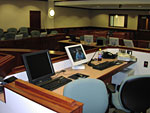By Elizabeth Stawicki
Minnesota Public Radio
May 7, 2002
When terrorists attacked the World Trade Center, reams of paper fell from the offices, littering the streets with confidential documents. Still, most of the towers' financial businesses were running the next day because they backed-up their files electronically. However most of the towers'law firms never turned their paper files into digital form and were left scrambling to recreate files. This is just one extreme example of how the legal profession has been slow to move into the digital world. But in Sherburne County, the state court system took a first step by unveiling its first E-courtroom.
| |
|
|
|
||
The E-Courtroom is the brainchild of Sherburne County Judge Alan Pendleton who grew tired of lugging his own computer equipment into court.
So he, along with local architects, electrical engineers and designers, created a courtroom that uses technology that Pendleton hopes will cut court time by 25 percent. They did it for about $80,000, half of what these courtrooms usually cost.
Here, every major party to the case has a monitor; the jury has six. The monitors are hardwired into what Pendleton calls an evidence desk. Display technologies on the desk can show everything from documents to guns to X-rays into the computer system so everyone can view evidence simultaneously.
"None of this is radical; this is technology that's been around for years. All we've done is incorporate it into a courtroom setting so the attorneys, the litigants, the jurors now have immediate access to things that normally took hours and days to get," Pendleton says.
The judge has ultimate control of the system. The judge can shut it down if necessary and can control who sees the information. If the judge wants to see a piece of evidence before the jury, he or she can just turn off the jurors' monitors.
The judge can also control what jurors and the audience hear. Attorneys often want to talk to the judge alone during trial. That leads to delays because the judge must call a recess, the jury must file out and information must be repeated for the court reporter. In the E-courtroom, Judge Pendleton can talk privately with the attorneys without disrupting the session.
"I turn the speakers off and I turn a masking sound on. That's a white noise now being eminated through the speakers over the audience gallery, over the jury panel so they cannot hear what I'm talking about now, that sounds drowns them out," he says. "The attorneys come up, we have a discussion with the sound system off. I still have an active line between my microphone and the court reporter's headphones and she can hear what our private conversation is. So it's immediately recorded, nobody has to take a break, and it's on the record."
Right now there are about 200 such courtrooms in the country, most are federal courts. In fact, federal judge James Rosenbaum has a similar court in Minneapolis. But as the costs decrease to build such courtrooms, counties are beginning to consider going digital, according to Law Professor Winton Woods (Listen to interview). Woods directs the Courtroom of the Future project at the University of Arizona Law School. Woods estimates that only five percent of trial lawyers know how to use the new technology. But he says that's changing as younger lawyers and judges take over.
"We're starting to see people who have grown up in the digital era instead of a paper based world. So as those younger people come to the bench, their knowledge and personal use of electronics makes them much more open to doing this kind of thing," Woods says.
Woods says courtrooms are on a path in which judges one day will have the ability to hold virtual trials where no one is in the same room. He says that may be problematic in criminal cases because defendants have a constitutional right to confront their accusers. But he says there are many other kinds of court proceedings like civil cases in which virtual trials may loom on the legal horizon.
More Information
